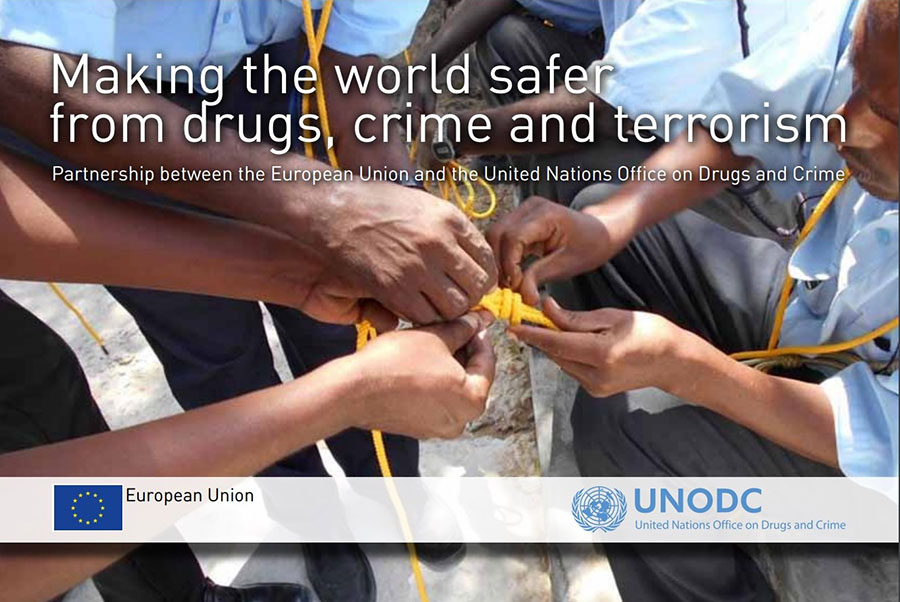The European Union (EU) and the United Nations Office on Drugs and Crime (UNODC) enjoy a long-standing and solid partnership, both in policy development and standard-setting work and in assisting countries to address key challenges related to drugs, organized crime, corruption and terrorism through projects pooling EU funding and UNODC’s expertise.
The brochure Making the world safer from drugs, crime and terrorism aims to highlight the achievements of the joint operational work – covering a range of areas related to drugs and transnational organized crime – since its beginning in 1987, when UNODC’s predecessor at the time, the United Nations Drug Control Programme, received funding for the first joint project in the Plurinational State of Bolivia supporting health services and community development in coca producing areas. Since then, 121 joint projects have been implemented, of which 26 are currently ongoing. In total the EU has provided funding to the amount of $377.3 million, representing some €351 million at the current exchange rate, of which $216 million, or €200 million, are being implemented in the ongoing portfolio.
In the initial years, individual projects and the overall portfolio remained small, focussing on drug demand reduction, alternative development and tackling drug trafficking. Support was provided to countries in Latin America and the Caribbean (predominantly covering drug demand reduction, alternative development and crop monitoring), while some assistance was provided to various countries in Sub-Saharan Africa, the Middle East and North Africa, and Asia (in support of drug demand reduction and some law enforcement and legal assistance). Support for Afghanistan and countries along the heroin trafficking routes began towards the end of the 1990s, focusing on counter narcotics law enforcement, precursor control, and border control and cross border cooperation.
The thematic diversification of the portfolio, however, truly began in the mid-2000s with a marked increase of EU support to UNODC’s work. This has continued to increase considerably in recent years as the complex – and often intertwined – challenges presented by illicit drugs, transnational organized crime and terrorism affect evermore countries and regions. Additionally, as the EU and its Member States collectively became the world’s largest aid donor, and the single largest financial contributor to the United Nations system, with it grew the size of the portfolio implemented together with UNODC.
Reflecting this, 2005 marked the first project on criminal justice reform and support to trials of suspected Somali pirates arrested in the West Indian region, leading to a series of subsequent followup projects. The major breakthrough of 2005 was the beginning of a large scale project supporting the Government of Nigeria in its anti-corruption efforts. The positive results of this project laid the foundation for the signing of three large scale projects in 2011 and 2012 to address the inter-connected challenges related to drugs, organized crime, corruption and justice reform.
In 2007, the first small contribution to address migrant smuggling was received; the project was implemented initially in Senegal, followed by regional projects in West, North and Southern Africa, and later on in Central Asia, Central America and finally at a global level, to address both migrant smuggling and trafficking in human beings.
In 2010, after a decade’s break, alternative development projects began receiving support again, this time for the countries in the former ‘golden triangle’ in Asia, specifically in Myanmar and the Lao People’s Democratic Republic (Lao PDR). Most recently, cooperation has grown to include counter-terrorism, which was initiated in 2012 with a regional project supporting countries in Southeast Asia, followed by a project in Nigeria and one for the Maghreb region, to assist in terrorism prevention and rule of law-based investigations and prosecutions.
Today, the EU and UNODC work together to support countries across the globe, covering the range of UNODC’s mandated areas. The brochure provides an overview of past and present EUUNODC cooperation across a range of areas. This includes: organized crime and illicit trafficking of drugs, precursors and firearms; drug use prevention, treatment and care; alternative development; trafficking in human beings and migrant smuggling; terrorism prevention; corruption, money laundering and asset recovery; crime prevention and criminal justice reform; violence against women; and maritime crime and piracy. The whole brochure is available here



